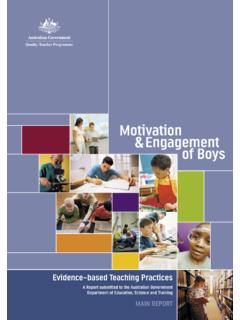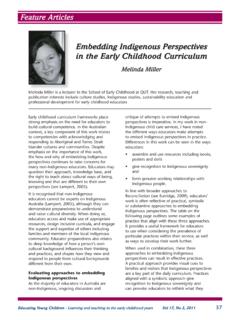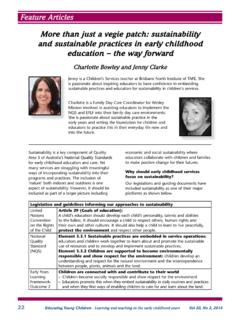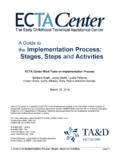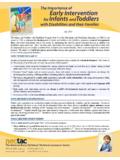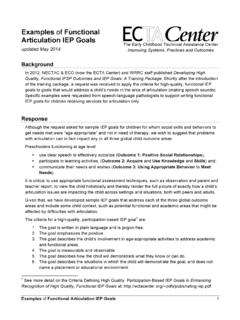Transcription of Dr Margaret Carter - ECTA
1 Behaviour development and guidance for infants and toddlers Dr Margaret Carter Margaret Carter works in a private practice as a behaviour change specialist based in Brisbane, Queensland. As a Behaviour Change Specialist she works with individuals and groups to help break patterns of dysfunctional behaviour, or to encourage patterns of behaviour which will help those groups or individuals to function more effectively. She works as a consultant, program designer, coach, mentor, teacher, developer and presenter of professional development material on a regular basis. She regularly conducts custom made professional development training programs for schools, kindergartens, outside school hours care, family day care, long day care and emergency in home care.
2 Every twelve months Margaret develops a public professional development training calendar. Topics covered during the twelve months include self care, behaviour development and management, conflict resolution for children, emotion management for children and for adults, bullying behaviours, change and change management, parenting for today's child, and grief and loss in childhood. Caring for Infants and Toddlers stress and discomfort. Brain Research indicates that prolonged high stress is destructive to More than any other time of life, the quality of learning in the child's first ten years. care children receive as infants and toddlers can make a profound and long-lasting difference to HINT: Early experiences impact on the brain and the child.
3 High quality care enhances children's affect the way the brain is wired. learning and promotes healthy development. According to Vygotsky, play is extremely HINT: Provide responsive and supportive care. important in children's development. He advocates that: How Young Children Learn Play creates the child's zone of proximal We need to have a sound grasp of how young development. In a play context, a child children learn. They learn through: can control behaviour such as time on task before being able to control that behaviour observation in another setting. real-life experiences Play facilitates the separation of thought social Interaction from actions and objects.
4 In play, children play. can pretend that a block is a tree; this separation of object from meaning is critical Infants and toddlers learn through their own to the development of abstract thinking. experiences, trial and error, repetition, imitation, Play facilitates the development of self- and identification. Adults guide and encourage regulation. In developing self-regulation, this learning and development by ensuring the children in play are required to match environment is safe and emotionally supportive. behaviour with role, a role they have Interaction with the environment is vital for whole accepted. brain development. The more a child generates ideas in play and informal settings the more fluent s/he will be in Young children's learning experiences need to generating solutions to the real and important include pleasure, enjoyment, freedom, active problems of life (Fisher 1990 pp.)
5 44-45). engagement and arousal without stress. Babies and toddlers are especially vulnerable to adversity HINT: Play stimulates the development of complex because they are less able to cope actively with brain networks. Educating Young Children - Learning and teaching in the early childhood years 33. Infants and toddlers generally behave according of security in knowing what is and is not theirs, to how they see themselves. How they see they begin to develop a willingness to consider themselves is significantly influenced by their sharing with others. growing knowledge of how to be acceptable to us. Infants and toddlers need to be accepted by Self control continues to develop with time and the important people in their lives.
6 Brain maturation and, in particular, development of the frontal lobes of the brain. To promote and A baby whose signals are responded to promptly nurture this stage of the child's development the and appropriately builds up a sense of competence adult needs to: a confidence that he can go through his own Know at what stage socially and activity, control what happens to him and this emotionally of development the child is at. confidence carries over to his transactions with his Adjust environment according to social physical environment (Ainsworth and Bell 1974). emotional development stages HINT: A baby's sense of self and of her ability to Know at what stage of play the child is at: make things happen grows daily in the context of unoccupied play, onlooker play, solitary loving relationships with a few caring adults.
7 Play, parallel play, associative play or cooperative play. The 12-18 month period is a time when toddlers Provide ongoing scaffolding, coaching and continue developing their capabilities as they guidance in living peacefully and safely learn self control. Part of this learning focuses on together. learning about controlling their impulse behaviour Initiate games of sharing and turn taking if this behaviour is not okay to the social context. Have equipment and materials available in greater quantities. Erikson's Eight Stages of Development (1956); Model and teach appropriate behaviours Mildred Parten's Stages of Play (1933) across contexts.
8 Be attentive to play and social interactions. Teach the toddler strategies to use in Intervene if and where appropriate. frustrating situations language in the Have a private place for cherished toys that form of words, gestures, asking for help, etc. can be used without fear of others taking Be a social coach. For example, You may them. not take the disc from Bob, but you may tell Promote language and thinking. him, "I want my turn now." or Ted, you can't hit Max, but you can tell him that you HINT: Provide learning activities that address don't like it when he takes your toy.' social and emotional development in a balanced, Observe environmental factors to anticipate integrated manner.
9 When a particular child is having (or about Two-year-olds continue to be highly involved to have) a social conflict. with their emerging sense of self, and defining Emphasize that you still like or love the themselves over and over with the word toddler even though you do not like the Mine!' They are still most interested in pleasing way she is choosing to behave. themselves and do not yet fully comprehend another child's perspective. It is not unusual for HINT: Babies and toddlers are social beings. They toddlers of this age to be verbally and physically benefit from positive, developmentally supportive aggressive in their play with objects and peers.
10 Behaviour guidance. Two-three-year-olds continue to learn about Around 18 months of age, toddlers begin developing their emotions, recognizing their displaying signs that they are developing an emotions, connecting emotions to their behaviour awareness of self. Claiming possession of toys and other objects is a way for toddlers to express Toddlers must be taught to express themselves their growing independence, competence and verbally, to learn how to express their feelings and autonomy. Once toddlers have developed a sense respond to them. Adults can assist in this process by: 34 Educating Young Children - Learning and teaching in the early childhood years Knowing at what stage socially and Wait for a physical response to key phrases emotionally of development the child is at.
